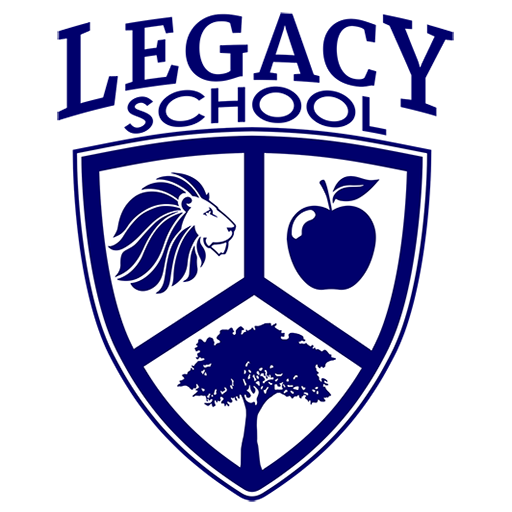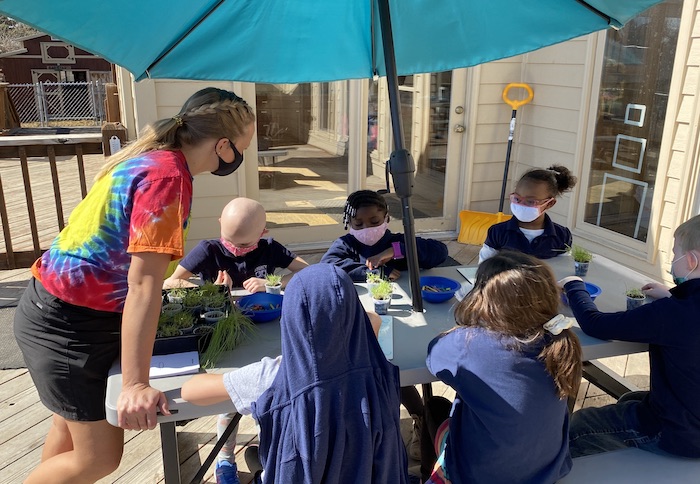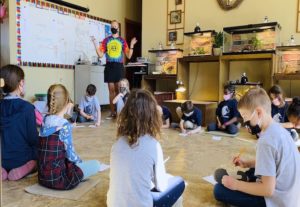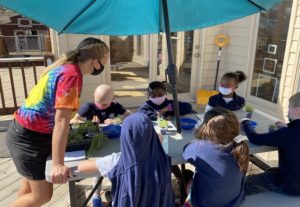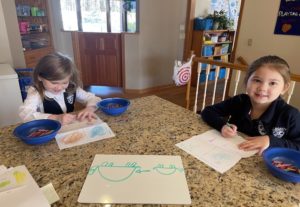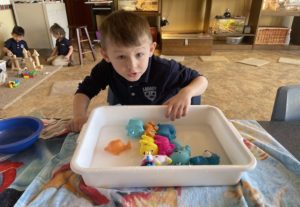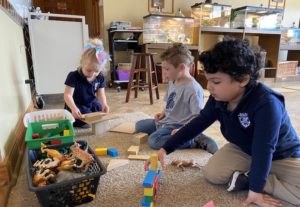Do you get excited about Science? We do! We sat down with Science Specialist Mrs. Amber Pierce to explore why Legacy School students get excited about Science. We’ll give you a hint: full-blown, hands-on Science experiences happen here!
About Science Specialist Mrs. Amber Pierce:
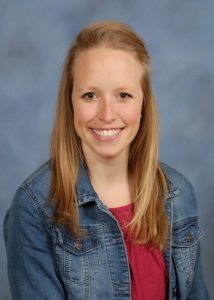
My name is Amber Pierce, and I attended Wayne State College, where I received my bachelor’s degree in Health Science Chemistry & Human Service Counseling. This year is my fourth year at Legacy School, and I am our Science Specialist and Extended Care Director. My oldest son is in Kindergarten this year at Legacy, and my youngest son will be attending preschool next year. I am currently seeking my Master’s in Counseling through Crown College.
Hands-On Science: An Interview with Science Specialist Mrs. Pierce
1.) Legacy School: Why do you love teaching Science at Legacy School?
Mrs. Pierce: I love teaching Science at Legacy because of the students’ excitement when they have the opportunity to discover new things! There is so much freedom at Legacy School with our unique curriculum, various animals, and outdoor spaces. It is just as fun for me to plan our weekly adventures as it is for the kids to get to participate!
2.) Legacy School: Why do you believe Science is so important to teach children at a young age?
Mrs. Pierce: Exposure is key! Exposure to several aspects of Science can help spark an interest in children at a young age and help them discover great potential and variety in Science.
3.) Legacy School: Do you design your curriculum? How do you decide what to include?
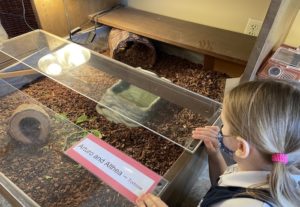 Mrs. Pierce: For elementary classes, I utilize our distinctive Science curriculum, Foss. With this curriculum, I can adapt lessons based on what Legacy has to offer. For example, when Kindergarten studied birds, we were able to see several types of birds as we explored our 11 acres, and not only that, we have our chickens! This experience led to an excellent opportunity for a connection between real life and learning. After Spring Break, we will be studying snails. To connect real life and learning again, we will incorporate our own shelled animal, our tortoise, Althea, into our studies. Along with our unique curriculum, I can expand our lessons more at Legacy School than other public and private schools because of our outdoor spaces and animals.
Mrs. Pierce: For elementary classes, I utilize our distinctive Science curriculum, Foss. With this curriculum, I can adapt lessons based on what Legacy has to offer. For example, when Kindergarten studied birds, we were able to see several types of birds as we explored our 11 acres, and not only that, we have our chickens! This experience led to an excellent opportunity for a connection between real life and learning. After Spring Break, we will be studying snails. To connect real life and learning again, we will incorporate our own shelled animal, our tortoise, Althea, into our studies. Along with our unique curriculum, I can expand our lessons more at Legacy School than other public and private schools because of our outdoor spaces and animals.
When it comes to Preschool, Pre-Kindergarten, Junior Kindergarten, and Enrichment’s STEAM program, I get to create the curriculum! I follow the standards necessary for this age group to learn. But then I have the freedom to design my own experiences and experiments to teach students these standards. For example, one of our standards is learning about the five senses. Students already knew about their five senses, so I met students where they were and created outdoor and indoor learning experiences to practice using our five senses. Another standard is discovering movement and how it changes-giving us the perfect opportunity to learn about simple machines! Once students understand the basics of simple machines, they will acknowledge more complex machines in their surroundings!
4.) Legacy School: How is your classroom set up to encourage learning with peers?
Mrs. Pierce: Each class begins in a circle with a large group discussion to review last week’s lesson and instructions for the day. The beautiful thing about Science is we have an entire house just for Science, so once we complete our large group discussion, we have the space to spread out into small group work! This same routine of large group discussion and small group work occurs from preschool through 6th grade, allowing for movement and exploration of many centers during our hour-long science class. Some centers are for independent exploration, while another center is for learning with me. This way, I can give specific instructions and assess for the understanding of the concept.
5.) Legacy School: How do you make learning fun to motivate students to learn more about Science?
Mrs. Pierce: Hands-on, hands-on, hands-on! The more students get to explore, the more excited they are about Science.
6.) Legacy School: Students are continually learning through hands-on science experiences. How do students interact differently than if they were to learn about Science by reading a textbook?
Mrs. Pierce: I recall my experience with Science in elementary school- it was reading from a textbook and completing a worksheet on the concept. Any hands-on Science activity was just a bonus! Maybe you can attest to a similar situation? It wasn’t until junior high, when Science became truly hands-on and interactive, that I realized I wanted to go into the field of Science!
A Different Approach: Elementary Science
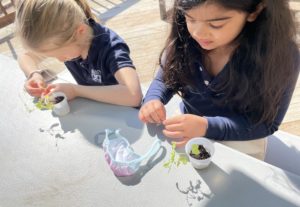 Our elementary Science curriculum, Foss, takes a different approach to the textbook-worksheet process. Instead, learning occurs through hands-on experiences and experiments, and the textbook is supplemental. That’s right; the TEXTBOOK IS SUPPLEMENTAL. Educators today are much more aware of issues students face in the realm of learning. I wholeheartedly believe that each student can learn through experience, but not every student can learn through a textbook. Let me repeat that- this is why Science is taught the way it is at Legacy; every student can learn through hands-on Science experiences, but not every student can learn through a textbook! This approach opens doors to Science for so many students who never thought it would be possible!
Our elementary Science curriculum, Foss, takes a different approach to the textbook-worksheet process. Instead, learning occurs through hands-on experiences and experiments, and the textbook is supplemental. That’s right; the TEXTBOOK IS SUPPLEMENTAL. Educators today are much more aware of issues students face in the realm of learning. I wholeheartedly believe that each student can learn through experience, but not every student can learn through a textbook. Let me repeat that- this is why Science is taught the way it is at Legacy; every student can learn through hands-on Science experiences, but not every student can learn through a textbook! This approach opens doors to Science for so many students who never thought it would be possible!
Hands-On Science Example: Elementary
Let me give you an example. In multi-age (4th, 5th, & 6th grade), we are currently studying Environments, and our topic was carrying capacity. Now, we could have read about the definition and completed a worksheet with math problems to understand the carrying capacity of a habitat. Instead, we went outside and used white chips, in which students had to collect enough for their deer to survive the year. As the population changed, the food source began to change, and we were able to have some interesting conversations. Not only did students realize that a certain amount of deer could survive in a habitat, but they also felt empathy for their animals and understood what survival of the fittest means.
After this experience, multi-age student Adrian stated, “It was fun to go outside to learn and explore!”
Another multi-age student, Bella, said, “I like how Mrs. Pierce made it a challenge. She gave us options and didn’t limit us in our learning!”
Hands-On Science Experiences: Extend Down to Preschool Program
Hands-on Science experiences extend down to our Preschool program. Currently, we are learning about what living things need. I love reading books to children; however, a student might not remember Mrs. Pierce telling them that living things need water, but they may remember playing in the water, which can trigger the knowledge of living things needing water. There is something to be said about the proprioceptive side to learning; knowledge is through body movement!
7.) Legacy School: What is your favorite lesson you have done with your students this year? (PreK/JrK & Elementary)
Mrs. Pierce: This is a difficult question because each class gets to do something different!
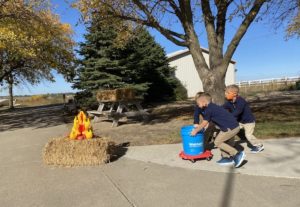 I loved our simple machine discovery for our pre-kindergarten and junior kindergarten classes. This lesson opened the door to the scientific method and challenged the students to think outside the box. My favorite was our discovery of wheels and pulleys through a firefighter obstacle course!
I loved our simple machine discovery for our pre-kindergarten and junior kindergarten classes. This lesson opened the door to the scientific method and challenged the students to think outside the box. My favorite was our discovery of wheels and pulleys through a firefighter obstacle course!
Elementary Science has been incredible this year! I might be biased with my chemistry degree, but I really enjoyed the Mixtures and Solutions lesson the multi-age class did. We started simply by creating mixtures out of two items we found outside and were finally able to create two new products through a chemical reaction by the end! Even so, we have discovered different plants, animals, states of matter, sound and light, all while utilizing engineering and outdoors.
8.) Legacy School: Legacy School is on 11 acres of land, allowing students to learn outdoors. How do you bring outdoor learning and Science together? Examples?
Mrs. Pierce: How do you not use our amazing outdoor space to learn about Science? The process has been easy, and our Foss curriculum encourages it!
Whether matter, sound and light, magnets and engineering, or mixtures, any topic we discover can be easily adapted to an outdoor setting. For example, we have explored solids outdoors, took mirrors outside to see how sunlight reflects, discovered items that are magnetic, and found outdoor materials to create a mixture. Also, our Kindergartners have adopted two class trees on our property that we regularly visit.
The space is genuinely incredible to get all of the students’ senses engaged as we take on different science concepts!
Even now, our Preschool, Pre-K, and Jr.K classes will begin to explore the outdoors for our current lesson of living vs. non-living things, right here at our school! These evolutionary Science lessons allow students to put concepts into practice, making their knowledge applicable to real life!
Interview Takeaways
Takeaway #1: Learning occurs through hands-on Science experiences and experiments at Legacy School. For elementary students, a textbook is SUPPLEMENTAL.
Takeaway #2: All classes, Preschool-6th grade, utilize the unique outdoor setting for hands-on Science lessons.
Takeaway #3: The more students get to explore, the more excited they are about Science!
The Legacy Private School in Omaha Advantage | Private Schools Nebraska
A New Choice in Education
Take A Tour
Thank you for your interest in Legacy School. We encourage you to schedule a tour and see what makes our school unique! Classes, differentiated instruction, and high academic standards all in a private school setting. Our 11 acres of land provide an outdoor education you will not see anywhere else. We invite you to tour our school today!
Outdoor Education
Legacy School sits on 11 acres of land, allowing for expressive, outdoor educational experiences for all students. Our outdoor learning and playing space allow for real-world experiences that cannot be found anywhere else. We utilize our unique location, with 11 acres of land for outdoor education and outdoor play, thus a chance to spend more time in an outdoor education setting.
Legacy Scholarship
We are proud to unveil our new Legacy School Scholarship Program. Students who attend Legacy from 1st grade are eligible for a $500 scholarship towards higher learning. This scholarship can be used for college or trade school upon graduation from high school. We are very excited to give back to our students. We know each child has the potential to succeed at whatever goal they set for themselves. Can’t wait to help your student celebrate their high school accomplishments and continue to their higher education.
